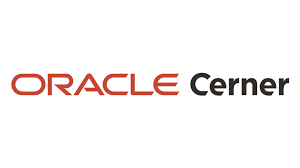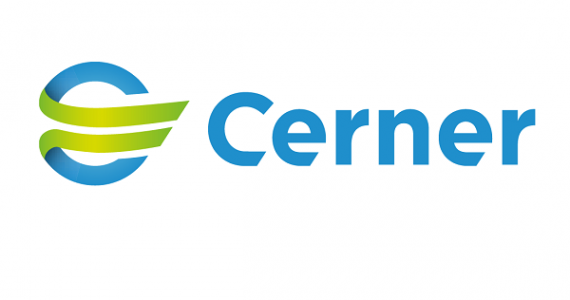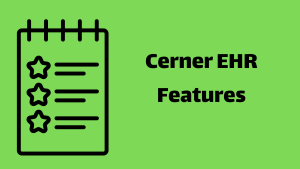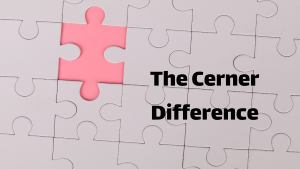![]()
CERNER EHR OVERVIEW
 Cerner, now owned by Oracle, spends billions of dollars on Research and Development “continuously building on our foundation of intelligent solutions for the health care industry”.
Cerner, now owned by Oracle, spends billions of dollars on Research and Development “continuously building on our foundation of intelligent solutions for the health care industry”.
Boasting $5.8 billion in revenue in 2021, Cerner helps “providers care for their patients while managing the business of care.”
While they are known for large implementations, Cerner also offers solutions to fit small to mid-sized practices.
WHO USES CERNER EHR?
 Cerner supports the needs of any size organization, small and large and is used at more than 27,000 facilities worldwide.
Cerner supports the needs of any size organization, small and large and is used at more than 27,000 facilities worldwide.
Quite notable, Cerner was selected by the Department of Defense (DoD) and the Veterans Administration (VA) to replace the legacy VistA EHR system. The contract is worth billions of dollars and is expected to take several years to complete.
CERNER EHR FEATURES
 Whether it is cloud based and/or on premise, Cerner EHR is ideal for all sizes and provides a long list of features and benefits, such as:
Whether it is cloud based and/or on premise, Cerner EHR is ideal for all sizes and provides a long list of features and benefits, such as:
- Terrific patient experience through its patient portal and patient education
- Comprehensive suite of solutions for data analytics
- Breadth of tools for clinical documentation
- Longitudinal record
- Seamless integration with revenue cycle solutions and services
- Dragon Voice Recognition
- Cerner EHR works as a Specialty EHR for many different medical specialties
Also, Cerner provides strategic advisory services, performance improvement, revenue cycle management, and community care management.
 DOES CERNER PROVIDE PRACTICE MANAGEMENT SOLUTIONS?
DOES CERNER PROVIDE PRACTICE MANAGEMENT SOLUTIONS?
Yes! Cerner provides a couple different solutions for practice management based on practice size.
- Cerner Specialty Practice Management – Ideal for small to mid-sized practices with 10 or less providers.
- Cerner PowerWorks Practice Management – Perfect for large sized practices and medical billing service organizations.
DOES CERNER OFFER REVENUE CYCLE MANAGEMENT (RCM) SOLUTIONS?
Of course! Often, medical practices look to outsource their collections so they can spend less time on the operations of the practice and more time on patient care. Cerner can take over your medical billing services including reimbursement and accounting processes. Cerner provides a couple solutions for billing and coding depending on the organization size:
- Cerner RevWorks for Hospitals
- Cerner RevWorks for Clinics
DOES CERNER SOFTWARE PROVIDE SPECIALTY EHRs?
They do. And they have the ability to support over 50 specialties making Cerner a popular choice for specialty practices of any size.
WHAT KIND OF TRAINING AND SUPPORT DOES CERNER OFFER?
Cerner provides a support model called the Cerner Client Care that gives first-class service to patients via solutions to “enable caregivers to correspond and communicate with other providers, clinicians and patients.”
The Cerner support portal is available to clients 24/7. Or clients can access Cerner via Cerner.com, uCern, online chat or the Cerner Support hotline.
Cerner takes security serious. They recommend every client have a Web Security Officer (WSO) who designates a person(s) at the organization to be responsible for controlling and granting access levels to an organization’s users.
Cerner Frequently Asked Questions
What is Cerner EHR?
Cerner EHR, also known as Cerner Millennium®, is a comprehensive, integrated electronic health record system designed to manage the healthcare information of patients across different care settings. It offers a wide range of functionalities, including patient management, health records, order entry, clinical decision support, and health information exchange among others. Its goal is to improve healthcare delivery by providing clinicians with timely access to accurate and complete medical records.
Is Cerner an EMR or EHR?
Cerner is primarily known for its Electronic Health Record (EHR) system. While the terms EMR (Electronic Medical Record) and EHR are sometimes used interchangeably, there is a distinction. EMRs are digital versions of paper charts in a clinician’s office, containing the medical and treatment history of patients in one practice. EHRs, on the other hand, focus on the total health of the patient, going beyond standard clinical data collected in a provider’s office and inclusive of a broader view on a patient’s care. EHRs are designed to share information with other health care providers and organizations. Cerner’s system aligns more with the EHR model, facilitating comprehensive health records that can be shared across different healthcare settings.
How Much Does Cerner EHR Cost?
The cost of Cerner EHR systems can vary widely depending on several factors, including the size of the healthcare organization, the scope of functionalities required, implementation costs, and ongoing maintenance and support fees. Cerner offers tailored solutions, which means pricing is often customized based on the specific needs of the healthcare provider. It’s common for such systems to involve upfront costs for software and hardware, plus additional fees for implementation, training, and annual support. Without direct quotes from Cerner, it’s challenging to provide a specific price range, but costs can range from thousands to millions of dollars for large implementations.
Are Cerner EHR Mobile?
Yes, Cerner does offer mobile solutions as part of its EHR system. These mobile apps and functionalities are designed to provide healthcare professionals with the flexibility to access patient data, manage tasks, and make decisions using smartphones or tablets, enhancing the ability to deliver care at the point of care and on the go.
How Long Has Cerner EHR Been Around?
Cerner was founded in 1979, and it has been developing health information technologies, including EHR systems, for several decades. The company has evolved its offerings over the years to keep up with the changing technology landscape and healthcare industry needs, making it one of the longstanding providers of EHR solutions in the market.
Is Cerner EHR Cloud-Based?
Cerner offers cloud-based solutions, recognizing the increasing demand for scalable, secure, and accessible healthcare data management systems. Cloud-based EHR systems provide benefits such as reduced IT infrastructure costs, enhanced data security, and improved accessibility to patient records across different locations and devices.
Is Cerner the Top EMR/EHR System?
While Cerner is certainly one of the leading EHR providers globally, whether it is “the top” system can depend on various criteria, including user satisfaction, market share, functionalities, and specific healthcare setting needs. Other major EHR providers include Epic, Allscripts, and MEDITECH, each with its own strengths and focus areas. Rankings and comparisons often vary by source and criteria used for evaluation. Cerner is highly regarded in the industry and is consistently ranked among the top EHR systems for its comprehensive features, scalability, and commitment to interoperability and innovation.
THE CERNER DIFFERNCE
 Cerner is an obvious choice as a top consideration for the vendor selection process and can provide scale due to its position in the health technology space. In an attempt to simplify how a practice interacts with its web based applications, Cerner introduced Cerner Care “a single sign on platform for most Cerner online applications and support websites for healthcare providers, healthcare IT professionals and partners.” Once this is set-up, you can sign in once (SSO) to access multiple web-based apps instead of having to manage various usernames and passwords.
Cerner is an obvious choice as a top consideration for the vendor selection process and can provide scale due to its position in the health technology space. In an attempt to simplify how a practice interacts with its web based applications, Cerner introduced Cerner Care “a single sign on platform for most Cerner online applications and support websites for healthcare providers, healthcare IT professionals and partners.” Once this is set-up, you can sign in once (SSO) to access multiple web-based apps instead of having to manage various usernames and passwords.
Additionally, Cerner is a frontrunner in technology and encourages innovators to build apps that “advance the health care industry through improved interoperability capabilities” through its Cerner Open Developer Experience (code).
CHECK OUT OTHER TOP EHR SOFTWARE
Information from www.cerner.com



 DOES CERNER PROVIDE PRACTICE MANAGEMENT SOLUTIONS?
DOES CERNER PROVIDE PRACTICE MANAGEMENT SOLUTIONS?